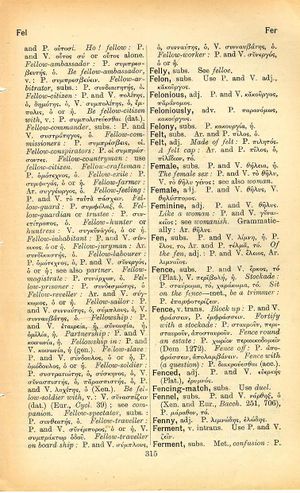feminine: Difference between revisions
From LSJ
καὶ ποταμοὺς τινας διαβάντες ἐν μεγίστῃ παρεγινόμεθα κώμῃ → and having crossed some rivers we reached a very large village
m (Text replacement - "(|thumb)\n(\|link=)" to "$1$2") |
m (Woodhouse1 replacement) |
||
| Line 1: | Line 1: | ||
{{Woodhouse1 | {{Woodhouse1 | ||
|Text=[[File:woodhouse_315.jpg|thumb|link={{filepath:woodhouse_315.jpg}}]] | |Text=[[File:woodhouse_315.jpg|thumb|link={{filepath:woodhouse_315.jpg}}]] | ||
P. and V. [[θῆλυς]]. | ===adjective=== | ||
[[prose|P.]] and [[verse|V.]] [[θῆλυς]]. | |||
[[like a woman]]: [[prose|P.]] and [[verse|V.]] [[γυναικεῖος]]; see [[womanish]]. | |||
[[grammatically]]: [[Aristophanes|Ar.]] [[θῆλυς]]. | |||
}} | }} | ||
{{Lewis | {{Lewis | ||
Revision as of 09:08, 20 May 2020
English > Greek (Woodhouse)
adjective
like a woman: P. and V. γυναικεῖος; see womanish.
Latin > English (Lewis & Short)
fēmĭnīne: adv., v. femininus.
Latin > French (Gaffiot 2016)
fēmĭnīnē, au genre féminin [t. de gramm.] : Arn. 1, 59.
Latin > German (Georges)
fēminīnē, Adv. (femininus), weiblich, als gramm. t. t., Ggstz. masculine, Arnob. 1, 59. p. 41, 15 R. Fest. 250 (b), 15. Charis. 72, 30.

